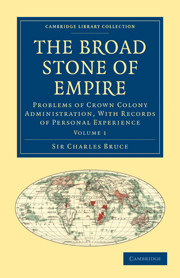 The Broad Stone of Empire
The Broad Stone of Empire Book contents
- Frontmatter
- Contents
- PREFACE
- CHAPTER I THE CROWN COLONIES
- CHAPTER II OUR NATIONAL POLICY, 1815-1868
- CHAPTER III OUR NATIONAL POLICY, 1815-1868—Continued
- CHAPTER IV OUR COLONIAL POLICY, 1815-1868
- CHAPTER V OUR IMPERIAL POLICY, 1868 AND AFTER
- CHAPTER VI THE COLONIAL OFFICE
- CHAPTER VII THE COLONIAL GOVERNOR
- CHAPTER VIII LOCAL GOVERNMENT
- CHAPTER IX LAW
- CHAPTER X LABOUR
- CHAPTER XI RACE
- CHAPTER XII HEALTH
- CHAPTER XIII HEALTH—Continued
- CHAPTER XIV HEALTH—Continued
- Plate section
CHAPTER II - OUR NATIONAL POLICY, 1815-1868
Published online by Cambridge University Press: 05 August 2011
- Frontmatter
- Contents
- PREFACE
- CHAPTER I THE CROWN COLONIES
- CHAPTER II OUR NATIONAL POLICY, 1815-1868
- CHAPTER III OUR NATIONAL POLICY, 1815-1868—Continued
- CHAPTER IV OUR COLONIAL POLICY, 1815-1868
- CHAPTER V OUR IMPERIAL POLICY, 1868 AND AFTER
- CHAPTER VI THE COLONIAL OFFICE
- CHAPTER VII THE COLONIAL GOVERNOR
- CHAPTER VIII LOCAL GOVERNMENT
- CHAPTER IX LAW
- CHAPTER X LABOUR
- CHAPTER XI RACE
- CHAPTER XII HEALTH
- CHAPTER XIII HEALTH—Continued
- CHAPTER XIV HEALTH—Continued
- Plate section
Summary
CONDITION OF THE PEOPLE
As the intention of my work is to illustrate a phase of colonial policy during the second half of the Victorian era, it may be thought irrelevant to dwell on the conditions of national life which determined the policy of the first half of that era in England. My reply must be that the colonial policy I propose to illustrate grew out of the national policy that preceded it; and I hope to show that the principles which worked out the social and economic salvation of England by methods appropriate to the national environment are capable of working out equally beneficent results by methods appropriate to the group of constituent parts of the Empire with which I am dealing.
The policy of England during the period following the Treaty of Paris in 1815 was dominated by the cult of Peace, Retrenchment, and Reform. It became a dogma of political faith that Peace, Retrenchment, and Reform constituted a trinity one and indivisible. In the leisure of peace a multitude of minds found time to survey the condition of the people, to recognise that the material and moral improvement of their condition constituted the only legitimate charge on the revenues derived from their labour in the development of national resources, and to realise from the experience of the past that the adjustment of this charge could only be effected through the agency of a reformed legislature.
- Type
- Chapter
- Information
- The Broad Stone of EmpireProblems of Crown Colony Administration, With Records of Personal Experience, pp. 37 - 56Publisher: Cambridge University PressPrint publication year: 2010First published in: 1910
